Key Highlights
- AI is reshaping routine marketing tasks but cannot replace creativity, empathy, and strategy.
- The fear of AI replacing marketing jobs is real, but it is more about role evolution than elimination.
- Tasks like reporting, keyword research, and first-draft content are best suited for AI.
- Humans still lead in cultural nuance, brand voice, ethics, and storytelling.
- Marketers must embrace AI as a team member to free up time and boost efficiency.
- “Will AI replace digital marketing?” The answer is no, but the discipline itself will evolve.
- Smart adoption requires human-in-the-loop oversight for accuracy and trust.
- Wild Creek’s Human + Algorithm approach balances machine speed with human judgment.
You open your laptop, and the panic sets in. Ten unread client emails. Three campaigns are overdue. A report your boss wants “right now.” And just when you think you cannot take on more, someone says, “Why not let AI do it instead?”
That question stings because deep down, you have thought about it too. If AI can write copy, run ads, and crunch numbers in seconds, where does that leave you? Ignoring it could cost you clients, credibility, and maybe even your job.
Here is the truth: AI is not a replacement for you. It is your secret weapon. Used wisely, it takes the grind off your plate so you can do what no tool can: create, connect, and lead. In this blog, you will see why AI will not replace digital marketers, how ignoring it could cost you dearly, and how making it your teammate helps you stay ahead of the curve.
What Is AI In Digital Marketing?
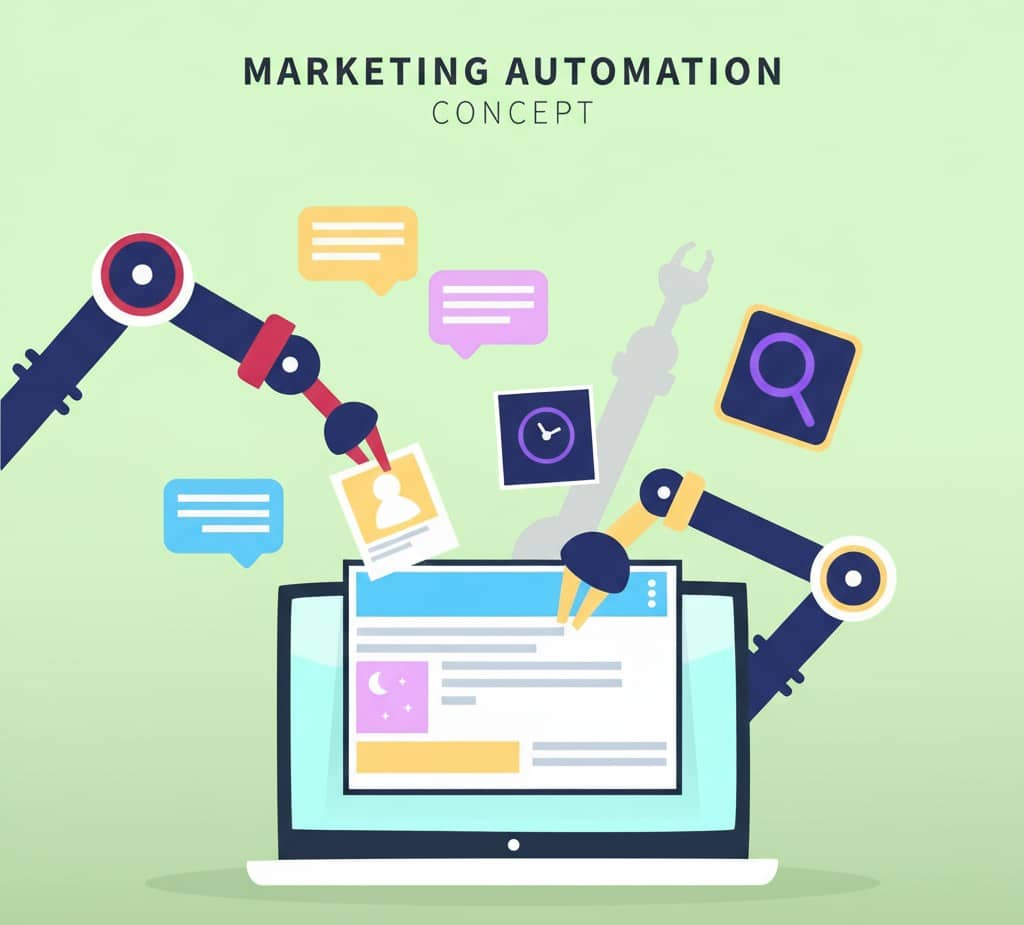
Marketing Automation Concept
Think about all the hours wasted on manual reports, endless keyword lists, or testing ad copy variations. These are the kinds of tasks AI can now handle in seconds. Ignore it, and you risk falling behind competitors who are already using it to gain an edge.
AI in digital marketing refers to the use of algorithms and machine learning to automate, optimise, and personalise tasks such as content creation, targeting, reporting, and customer engagement.
As Sundar Pichai said, “The future of AI is not about replacing humans, it is about augmenting human capabilities.” That is exactly what makes it powerful in marketing. It does not think like a human but identifies patterns in data to deliver speed, accuracy, and scale.
Why Are Marketers Worried About AI Taking Over?
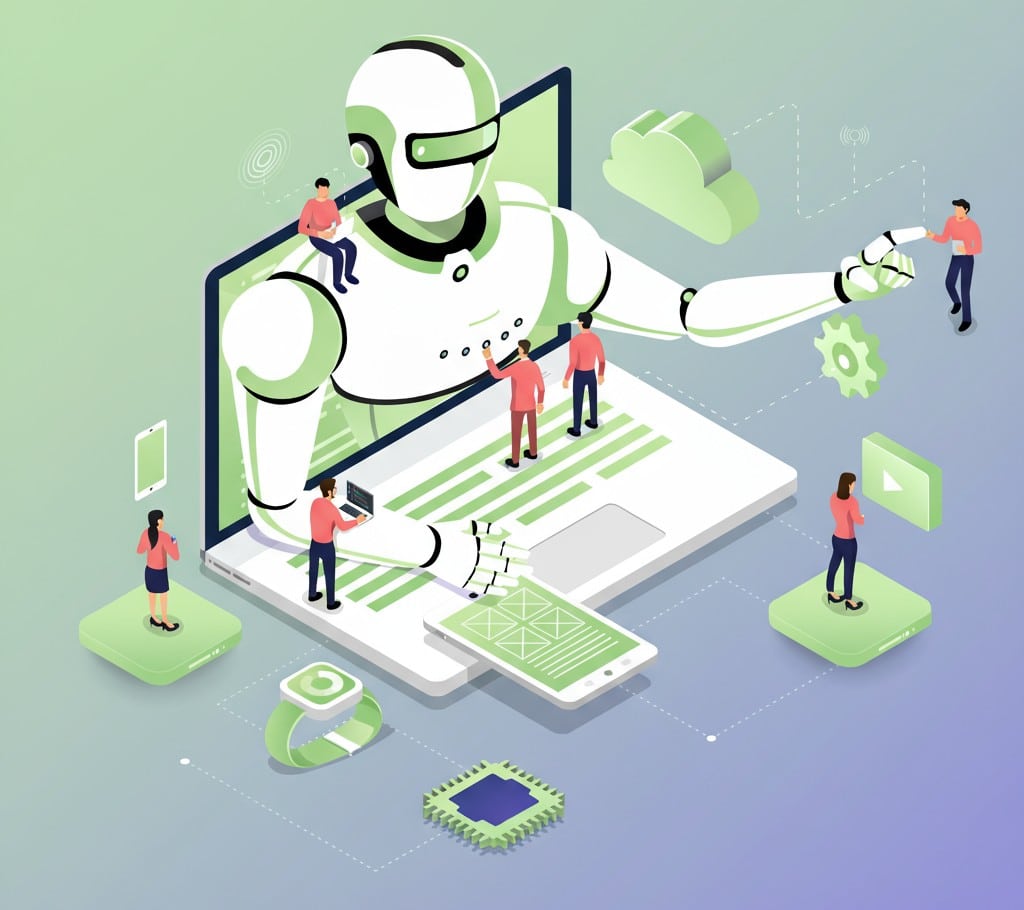
Artificial Intelligence in Technology
Be honest. How many nights have you stayed up tweaking ad copy, double-checking reports, or manually pulling SEO data? You pour hours into routine tasks, only to hear someone say, “An AI tool can do this in minutes.” That hits hard, doesn’t it?
The fear is not imaginary. If you keep relying only on repetitive tasks, AI will outpace you. The danger is clear: if you don’t adapt, your value risks being measured in tasks machines can do faster and cheaper. And that’s a game no human wins.
When Routine Work Turns Against You
Here’s how the everyday tasks you slog through suddenly look different once AI steps into the picture.
| Your Daily Grind | How AI Shakes It Up | What You Could Lose |
| Endless reporting | AI tools build dashboards instantly | Your manual hours feel redundant |
| Content drafting | AI creates blog outlines in seconds | Clients may question paying for drafts |
| Ad testing | AI scales hundreds of copy variations | Your time is pulled from strategy |
| Keyword research | AI analyses search data at scale | Your role risks looking like data entry |
Marketers who stick to repetitive work risk being replaced, but those who move up to strategy and creativity will remain indispensable!
The Hidden Cost Of Standing Still
When clients seek to cut costs, they often view AI as the more cost-effective choice. When bosses demand speed, they see AI as the faster choice. If you stick to only manual tasks, your role shrinks. That is why the fear of AI replacing marketing jobs is spreading quickly.
But here is the truth. This is not the end of your career. It is your chance to shift from task-doer to strategist, from executor to value-creator. AI is not the rival; it is the tool that can free you to do work no machine can.
Is AI Taking Over Digital Marketing Jobs?
You may already sense it in your role: fewer junior openings, job descriptions demanding AI skills, and growing pressure to deliver faster with fewer resources. AI is not only reshaping the broader workforce; it is also rewriting the future of digital marketing jobs.
At the same time, the anxiety is real. Influencer Marketing Hub reports that 60% of marketers fear AI could replace parts of their roles, while over 70 per cent believe AI tools can already outperform humans in specific tasks.
It is no surprise that many marketers feel threatened. Yet the picture is not all dark. As Ginni Rometty puts it, “AI will not replace humans, but those who use AI will replace those who don’t.”
For digital marketers, the takeaway is simple. Routine tasks, such as keyword research, content drafting, and reporting, will be automated first. At the same time, new opportunities are opening in AI strategy, prompt design, and data-driven decision-making. The ones who thrive will be those who pair AI’s speed with human creativity and empathy.
Digital marketing jobs are not vanishing; they are evolving. Stick to manual execution, and you risk fading out. Use AI as your teammate, and you not only stay relevant, but you also lead.
How Is AI Changing Marketing Right Now?
The impact of AI is already visible in your daily work. From faster reports to instant ad copy, tools are streamlining repetitive tasks. For marketers, this means less time on the grind and more pressure to show results. However, without adapting, you risk being outpaced by your peers who have already embraced these tools.
Where You See the Change Already
AI is no longer a future trend; it is here now. It is in your inbox, your ad manager, and your SEO dashboard. The tools you use every day are already weaving in automation. You are probably experiencing some of these shifts right now:
| Area of Work | Immediate AI Impact | What It Means for You |
| Reporting | Dashboards and summaries generated instantly | You spend less time compiling and more time interpreting |
| Content Creation | Drafts, outlines, and social captions created in seconds | First drafts are faster, but editing and brand voice are still on you |
| Email Marketing | Subject line testing and personalisation automated | Smarter campaigns, but empathy and persuasion remain human |
| SEO and Keyword Research | AI scans search patterns at scale | Quicker suggestions, but strategy requires your judgment |
| Ad Copy | Multiple variations produced instantly | Faster testing, but the winning idea still needs human insight |
The speed is exciting, but it is also unsettling. Suddenly, tasks that defined your role can be completed in minutes. The fear is that your value will shrink with them. The truth is that marketers who win are those who shift their focus to higher-value skills, such as strategy, creativity, and client trust.
How Are Companies Using AI Effectively?
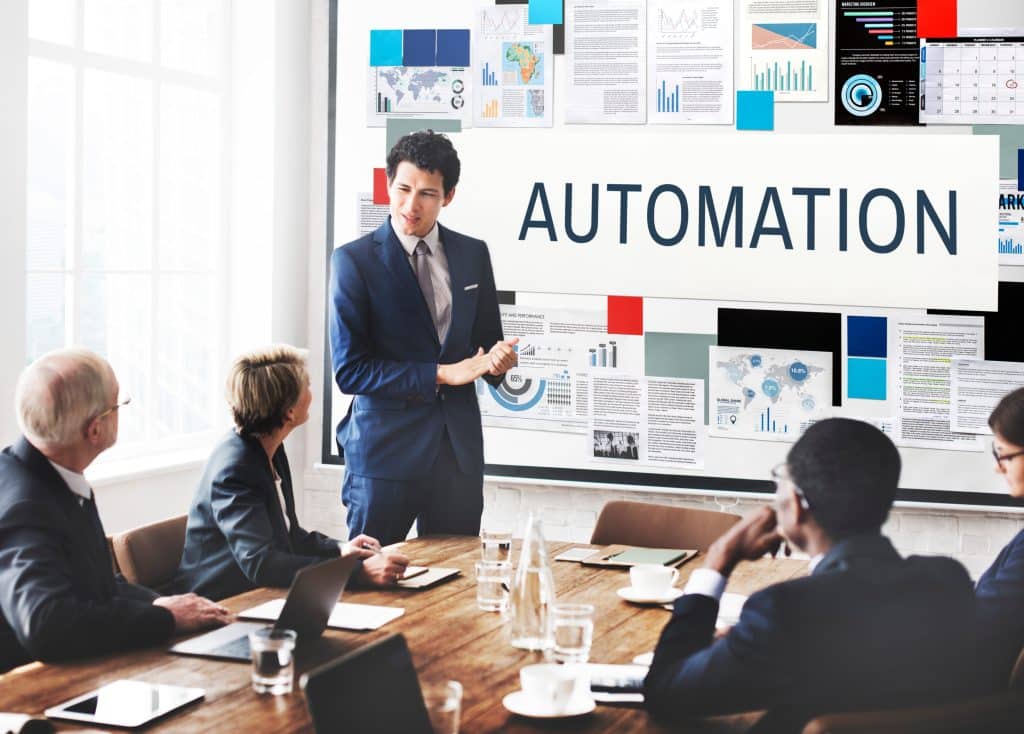
Automation Strategy Presentation
From Zomato to Airtel, Indian brands are already using AI to personalise experiences and boost efficiency. The promise is real, but for marketers, the pressure is clear: use it wisely or risk being left behind. But here is the catch. While businesses see the promise, the pressure falls directly on you, the marketer. If you cannot show how to use these tools well, you risk being left behind.
At the top, leaders are under just as much strain. CMOs and marketing directors face constant demands to prove efficiency gains and productivity boosts. AI looks like the golden ticket, yet choosing the wrong platform or using it blindly can backfire, damaging brand trust, misusing data, or losing the human voice customers connect with.
This raises urgent questions every marketer should be asking:
- Which AI tools actually save time without compromising quality?
- Which functions can be automated safely, and which must stay human?
- How do you protect your work from AI risks such as bias, inaccuracy, or lack of transparency?
Across India, several brands are experimenting with AI in different ways:
- Zomato utilises AI-driven chatbots to handle customer queries, while human support addresses more complex complaints.
- Swiggy leverages AI for predictive order recommendations, but creative teams still craft marketing campaigns.
- Vedantu applies AI to personalise student learning paths, while educators shape the content and pedagogy.
- Tata CLiQ and Flipkart apply AI for automated product suggestions and search, but brand storytelling and ad strategy remain human-led.
The smart move is not to resist AI, but to master it. Marketers who treat AI as a teammate, freeing themselves from repetitive tasks to focus on creativity and strategy, will stand out. Those who ignore it will find their roles shrinking fast.
This is the space we thrive in at Wild Creek. We let AI do the heavy lifting, but it’s our human touch that drives campaigns forward. Discover our Human + Algorithm approach.
What Is an AI-First Approach?
More and more companies are racing to call themselves “AI-first.” For leaders, this phrase signals ambition, faster production, lower costs, and a future-ready workforce. But for employees, it sparks uncertainty. The promise of efficiency often comes with the fear of job cuts, loss of creativity, and increased reliance on algorithms over human judgment.
An AI-first approach is not just about adopting technology; it is about rethinking entire business functions, from marketing campaigns and content generation to customer service and product recommendations. The challenge lies in finding the balance where AI drives scale and speed, while people continue to provide strategy, empathy, and the human connection that keeps brands alive.
How Companies Are Testing AI-First Strategies?
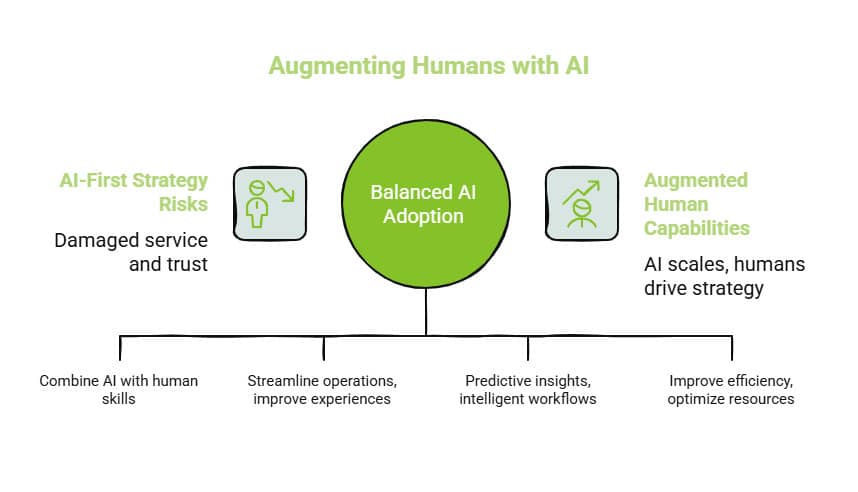
Augmenting Humans with AI
Some firms have rushed to prove they are at the cutting edge of innovation. Fintech player Klarna announced an AI-first pivot, freezing hiring and replacing parts of its customer service with AI. But customer frustration rose, and the company quickly rolled back, realising that empathy and nuance still need a human touch.
Others, like Duolingo, heavily rely on automation to reduce their reliance on contractors. The decision backfired with young users, who took to TikTok to protest the shift, proving that brand trust can suffer when AI feels impersonal.
At the same time, several global companies are experimenting with AI-first adoption in different ways:
- Wild Creek Studio – Championing the Human + Algorithm philosophy to combine AI-driven efficiency with human creativity, empathy, and strategic insight
- Shopify – Using AI to power customer experiences and streamline internal operations
- Cisco – Deploying AI for predictive insights and more intelligent workflows
- UPS – Leveraging AI to improve logistics and delivery efficiency
- Intuit – Embedding AI in financial planning and tax solutions
- IKEA, Mastercard, Uber Eats, L’Oréal – Rolling out AI-powered chatbots for customer interactions
- U.S. Bank – Running campaigns with AI-generated audience models for testing content
- John Deere – Using AI-powered “See & Spray” to optimise farming resources
These examples show both the promise and the risk of going AI-first. Move too fast, and you damage service and trust. Strike the right balance, and AI scales the work while humans drive strategy, creativity, and empathy. AI-first is not about replacing people; it is about augmenting them.
5 Smart Moves to Future-Proof Your Marketing Career
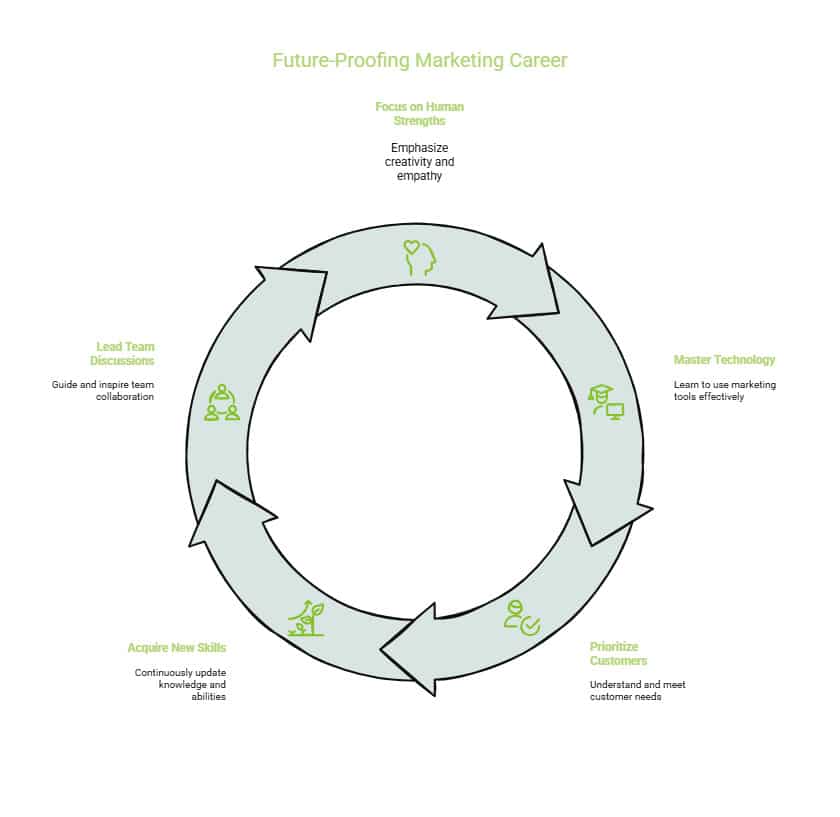
Future Proofing Marketing Career Framework
The fear is real. Every week, a new headline appears about AI replacing marketing jobs or automating entire workflows. However, the truth is clear: AI will not replace marketers who adapt; it will replace those who remain stagnant. Here are five practical ways to ensure your skills remain valuable.
1) Double Down on Human Strengths
AI excels at scale, but struggles with emotion. It cannot handle nuance, empathy, or cultural context. As a marketer, your edge lies in creativity, persuasion, and understanding people, things no machine can replicate.
Example: AI replacing email marketing can optimise subject lines, but it cannot sense the subtle humour or urgency that makes people click.
2) Learn to Steer the Technology
Will AI replace marketers who ignore it? Possibly. That is why you need to master the tools. Experiment with AI for SEO, content, and reporting, but keep your role as the driver. When you steer the machine, you remain in control of the outcome.
Example: An AI tool can suggest keywords, but it is you who decides which ones fit your brand’s voice and strategy.
3) Put Customers at the Centre
AI can crunch demographics and predict behaviour, but it cannot fully grasp human desire. Marketers who prioritise empathy and real-world insights will always stand out.
Example: AI might segment your audience, but you know why a story about aspiration resonates better than one about discounts.
4) Keep Building New Skills
Digital marketing never stands still, and with AI moving faster than ever, learning is your armour. Develop AI-ready skills, including prompt writing, analytics, and creative direction, and continue to experiment. Every new skill widens the gap between you and the marketers who resist change.
Short online programmes, workshops, or even self-led practice sessions can help you stay ahead.
5) Lead the Conversation in Your Team
Every organisation needs someone to demystify AI. Be that person. Share prompts, run small experiments, and demonstrate how tools enhance value without compromising authenticity. Position yourself as the AI guide your team can trust.
Companies that adopt AI more quickly often have an internal champion who bridges the gap between technology and creativity. That champion can be you.
At the end of the day, it is not AI that decides your future, it is how you choose to use it.
Struggling to Balance AI With Human Creativity?
If you are worried about AI replacing marketing jobs or feel overwhelmed by endless tools, you are not alone. Many marketers struggle to keep up with automation while still maintaining brand voice, trust, and empathy. The result? Burnout, inconsistent results, and missed opportunities.
That is where Wild Creek Studio comes in. With its unique Human + Algorithm approach, Wild Creek helps you harness the speed of AI while preserving the creativity and strategy that make your brand stand out.
Here is why businesses trust Wild Creek Studio:
- Human + Algorithm Philosophy – Blending AI efficiency with human creativity, empathy, and judgment.
- 18+ Years of Expertise – Proven success across SEO, paid campaigns, and digital growth strategies.
- Transparent, Tailored Solutions – No cookie-cutter plans, only strategies built for your unique goals.
- Proven Track Record – 100+ clients served with measurable results and long-term growth.
Ready to think better, not just faster?
👉 Book a consultation with Wild Creek Studio and discover how to future-proof your marketing.
Final Words
AI is transforming digital marketing by automating tasks such as data analysis, content generation, and social media posting. Yet it cannot replace human marketers who add creativity, emotional intelligence, and authentic human connection.
Marketers who pair AI’s efficiency with strategic thinking and empathy will thrive. The future of marketing belongs to those who adapt, using AI as a tool to create more innovative campaigns and stronger relationships.
Frequently Asked Questions
Has AI already led to job losses in digital marketing?
Yes, some entry-level roles tied to basic content creation and administrative tasks have been reduced due to AI adoption. However, many new opportunities are emerging in areas like content optimization, predictive analytics, and AI-driven marketing strategy.
Will AI ever handle creative work as well as humans?
Artificial intelligence can support content generation, blog posts, product descriptions, and even social media posts, but it cannot fully replicate emotional intelligence or human connection. Human marketers remain essential for creativity, storytelling, and building relationships with audiences.
Is AI expected to create more jobs or new roles for marketers?
Yes, the rise of AI is creating demand for new use cases such as content creation tools, data analysis, and natural language processing. Marketing leaders now look for SEO specialists and AI strategists who can generate actionable insights and improve conversion rates.
What do industry experts like Sam Altman say about AI replacing marketing jobs?
Experts such as Sam Altman argue that while AI will automate many business functions, it will not fully replace human marketers. Instead, marketers who learn to know marketing with AI will become better marketers in the future of marketing.
How will AI impact social media marketing campaigns?
AI is already helping manage social media accounts, automate social media posts, and improve ad campaigns with A/B testing. However, human oversight is still needed to interpret customer behavior and ensure brand voice aligns with marketing strategy.
Can AI improve content marketing results?
Yes, AI-driven content creation tools assist with content optimization, content generation, and search engine optimization by analysing vast amounts of data. Yet, human marketers must guide tone, relevance, and storytelling to keep marketing campaigns authentic and effective.
What are the main use cases of AI in marketing?
AI is widely used in market research, predictive analytics, product recommendations, blog posts, email subject lines, and handling customer queries. These use cases free marketers to focus on strategic decisions, customer relationships, and campaign innovation.
How does AI affect marketing teams today?
AI automates repetitive tasks such as basic content creation, reporting, and b tests. This allows marketing teams to focus more on customer behaviour analysis, creative ad campaigns, and building relationships, making them more efficient in the marketing world.
What is the bottom line for marketers in the age of AI?
The bottom line is clear: AI will not replace digital marketing, but marketers who use AI effectively will outperform others. Human oversight, creativity, and emotional intelligence remain vital in turning AI insights into impactful marketing campaigns.
